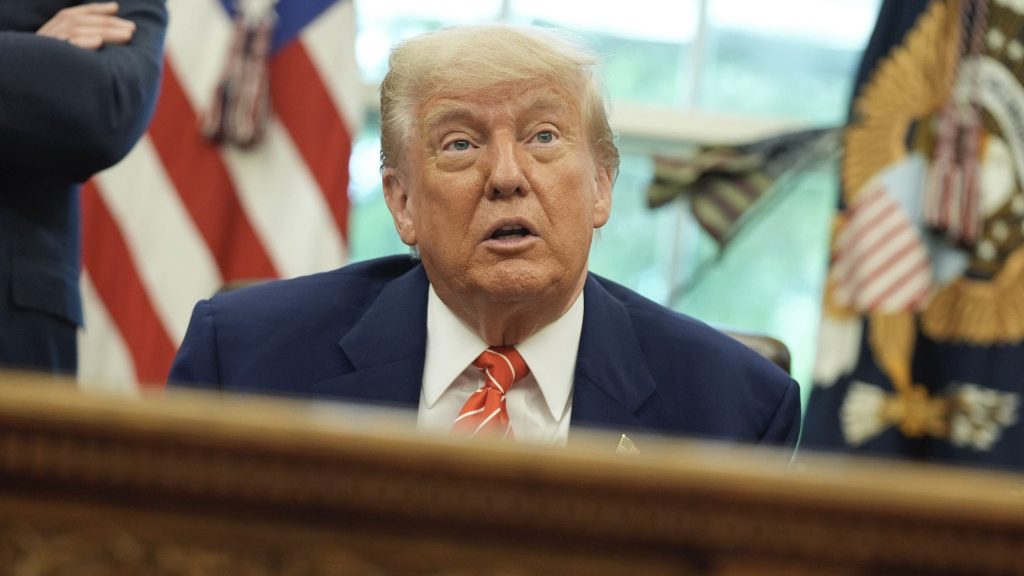In the wake of President Donald Trump’s second term, recent polls indicate a troubling outlook for his approval ratings. Survey data reveals that while the president enjoys some support on specific issues like border security and immigration, overall, his approval remains slightly under water, with significant challenges ahead. As his administration has made sweeping changes to federal policies through executive actions, the long-term implications for both his governance and public perception will be closely watched.
| Article Subheadings |
|---|
| 1) Current Approval Ratings of President Trump |
| 2) Executive Actions and Policy Changes |
| 3) Specific Issues: Border Security and Immigration |
| 4) Economic Concerns Impacting Approval |
| 5) The Path Forward for Trump’s Administration |
Current Approval Ratings of President Trump
As of this month, various national surveys indicate that President Trump’s approval ratings are concerningly low. In a survey conducted by Marquette Law School, 46% of respondents approve of his performance, while 54% disapprove. Through a Reuters/Ipsos poll, Trump was shown to have only 42% approval versus 52% disapproval, demonstrating a notable decline since his inauguration in January.
These figures suggest that Trump’s efforts to solidify his support may not be yielding the desired results. While some polls have indicated slightly better scores for him, the consensus reveals a troubling trend as he grapples with multifaceted challenges in his second term.
Executive Actions and Policy Changes
President Trump has taken an assertive approach in his second term, aggressively utilizing executive authority to overturn previously established government policies. His administration has rolled out several controversial executive orders aimed at reshaping the federal workforce. These sweeping actions reflect Trump’s desire to address grievances that have persisted since his first term.
While these actions resonate with Trump’s base, they have also drawn criticism from various sectors, indicating varying degrees of public acceptance. The push for significant reforms and changes within the federal workforce underscores his commitment to enacting policies that align closely with his campaign promises and overall governance strategy.
Specific Issues: Border Security and Immigration
Despite the challenges faced by Trump in overall approval ratings, he maintains a positive reception on two key issues: border security and immigration. In the Marquette Law School poll conducted from May 5-15, Trump’s approval for handling border security was recorded at a robust 56%, while immigration took a lesser, but still notable, 50% approval rating.
These results reflect the significant focus Trump’s 2024 campaign placed on these topics, which played a central role in his electoral success. However, experts such as Daron Shaw, a member of the Fox News Decision Team, have indicated that as immigration concerns diminish in salience among voters, the president’s ability to leverage these issues for sustained approval may weaken.
Economic Concerns Impacting Approval
While Trump enjoys some success regarding border security and immigration, the lingering issue of the economy weighs heavily on his overall approval. Many Americans continue to feel the repercussions of inflation, an issue that impacted former President Joe Biden during his tenure. Trump’s economic policies, including a contentious tariff announcement, have contributed to concerns regarding a potential recession.
Recent polling shows that Trump only garners a 39% approval rating concerning the economy and a mere 34% regarding inflation. Critics cite these figures as indicative of a larger pattern: voters’ frustrations with rising costs will likely impact their perception of his presidency.
The Path Forward for Trump’s Administration
As President Trump navigates through these turbulent political waters, the key to maintaining support may lie in addressing pressing issues with more effective action. The association of high prices with his administration has created skepticism among constituents. Doug Heye, a GOP strategist, suggests that “the main reason Trump won was to lower prices. Prices haven’t lowered, and polls are reflecting that.”
Trump appears to recognize the need for immediate intervention to stabilize public sentiment, particularly in regards to economic policies. As the political landscape evolves, the administration’s strategic maneuvers will be crucial in restoring public trust and confidence.
| No. | Key Points |
|---|---|
| 1 | President Trump’s approval ratings are currently low, hovering around 46% approval and 54% disapproval. |
| 2 | The president is utilizing aggressive executive actions to reform federal policies that have drawn both support and criticism. |
| 3 | Trump has maintained strong approval ratings regarding immigration and border security, but these may not be sustainable. |
| 4 | Concerns over inflation and economic performance are significantly impacting Trump’s overall approval ratings. |
| 5 | Strategic adjustments in policy could be necessary for Trump to regain public confidence as economic challenges persist. |
Summary
The initial months of President Trump’s second term have revealed a complex interplay between his assertive policy changes and fluctuating public support. While he remains buoyed by some approval ratings concerning immigration and border security, serious economic concerns could undermine his administration’s stability. Moving forward, the administration’s willingness to address the pressing issues facing the American public may determine the trajectory of Trump’s presidency.
Frequently Asked Questions
Question: What are President Trump’s current approval ratings?
President Trump’s approval ratings currently stand around 46% approval and 54% disapproval, showing mixed public sentiment since his second term began.
Question: What executive actions has Trump undertaken in his second term?
Trump has initiated several controversial executive orders aimed at reshaping government policies and reducing the federal workforce, which aligns with his campaign promises.
Question: How are economic concerns affecting Trump’s approval?
Economic concerns, particularly inflation and rising costs, have led to a decrease in Trump’s overall approval ratings. Many voters associate these issues with his administration’s effectiveness.
